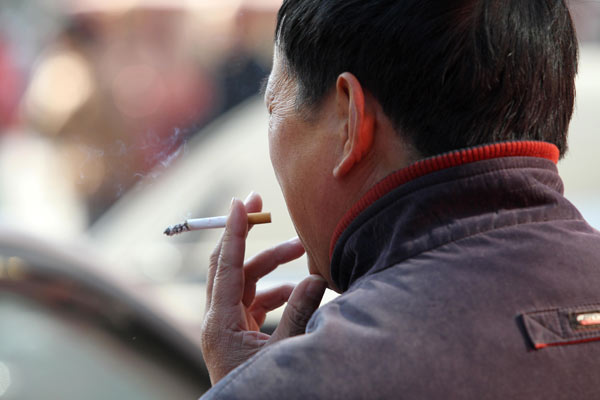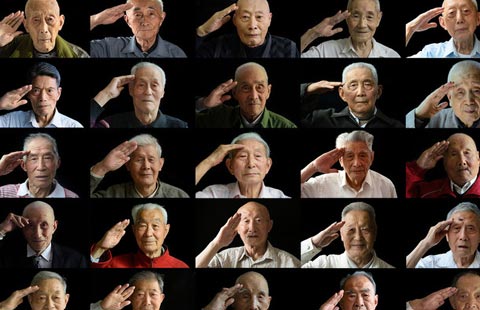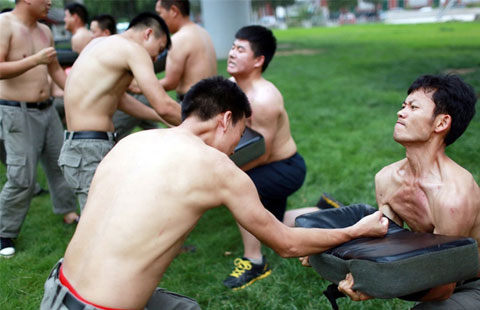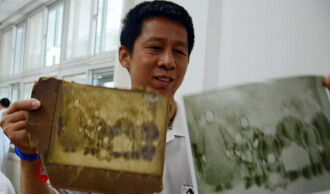Public smoking ban for officials faces hurdles
By Wang Qingyun ( China Daily ) Updated: 2014-01-02 00:01:48
|
 |
|
A man takes a cigarette break in a public place in Nantong, Jiangsu province, on Nov 30. Provided to China Daily |
A ban on Party and government officials smoking in public places or during official activities may face huge challenges in implementation, government officials and experts said.
A circular released on Sunday by the central government bans Party and government officials from smoking in places such as schools, hospitals, sporting venues, museums and public transport vehicles.
It also bans them from smoking during "official activities", including meetings and business dinners, according to Wang Yukai, a professor at the Chinese Academy of Governance.
However, an official in Xuchang, Henan province, who only gave his surname as Zhen, said it will not be easy to put the bans into practice.
"When we go to visit villages on business, village cadres and other villagers offer us a cigarette as etiquette. They will think you are taking on airs if you refuse to take it," he said.
"Also, like drinking, if you don't smoke while everyone else around you is smoking, it complicates your work because you won't be able to blend in, and over time you may find yourself ostracized."
Zhen said he saw officials who were taking part in meetings smoke in the hotel during breaks.
Beijing Times quoted an unnamed official in Hunan province as saying that when the highest-ranking official at a conference began to smoke in the venue, others would follow suit.
Xie Chuntao, a professor of the Party School of the Central Committee of the CPC, told Xinhua News Agency that smoking, which may appear to be a private matter, can have unexpected effects when done in public.
"If one of your leaders smokes, you have to smoke with him to avoid awkwardness, and one of the most common greetings among officials is to exchange cigarettes," Xie said.
Sixty-one percent of male Chinese civil servants smoke, and 52.7 percent of them said they have never tried to quit, according to the Chinese Association on Tobacco Control.
Suo Chao, an association project manager, said he has found civil servants who are encouraged or pressured to smoke.
"What should you do if your boss offers you a cigarette? Should you take it or not?" he said.
But Yang Gonghuan, vice-president of the association, said the circular could help lower the smoking rate among officials and change the smoking tradition.
"Grassroots officials can choose to decline villagers' offers of cigarettes by informing them about the circular and telling them smoking is bad for their health. Things could change through such persistant efforts," she said.
"Decades ago, some central government leaders smoked (in public places), but now they don't. It's because of a change in culture."
The circular deals not only with smoking, but also potential graft, Yang added.
"The high smoking rate among officials has something to do with corruption because many of the cigarettes they get have been offered as gifts," she said, referring to the circular banning the use of public funds to buy cigarettes.
"The sale of wine and the revenue for high-end restaurants dropped significantly after the government's policies came out. I believe this circular will be as effective."
The central government set a goal to ban smoking in public places in the 12th Five-Year Plan (2011-15). But there is not yet a national law banning smoking in public places.
Yang suggested such a law is needed to legalize the proposals in the circular.
- Legal loophole undermines smoking ban
- Frustration with smoking ban
- Health inspectors express frustration with smoking ban
- Challenges remain for smoking ban
- Smoking ban reinforced
- Smokers on trains to face big fines
- Smoking cessation products pose no serious heart risks
- Experts call for more tobacco control
- Anti-smoking clinics low on medicine
- Cities struggling to enforce bans on smoking in public
- Officials banned from smoking in public
|
|
|
|
|
|
|
|


















 Op Rana
Op Rana Berlin Fang
Berlin Fang Zhu Yuan
Zhu Yuan Huang Xiangyang
Huang Xiangyang Chen Weihua
Chen Weihua Liu Shinan
Liu Shinan